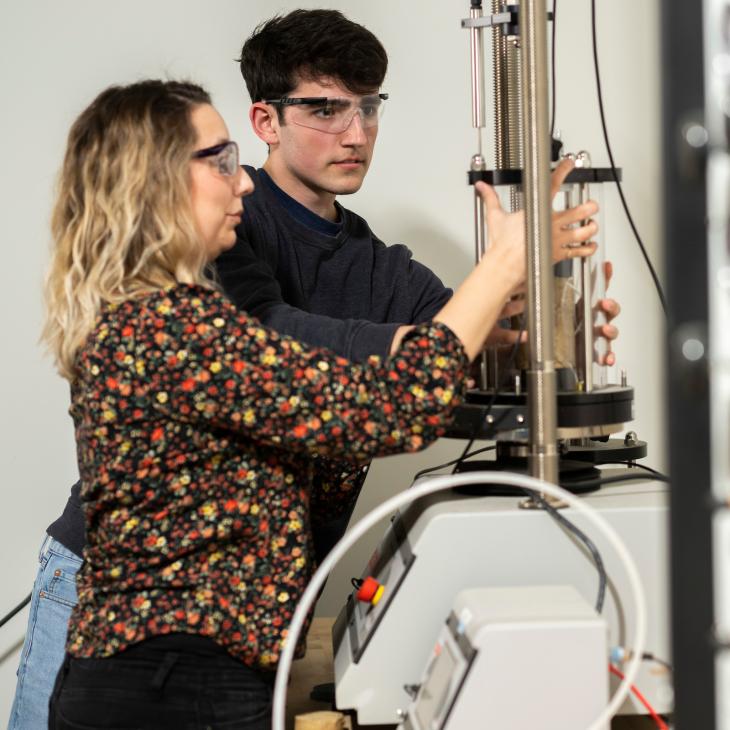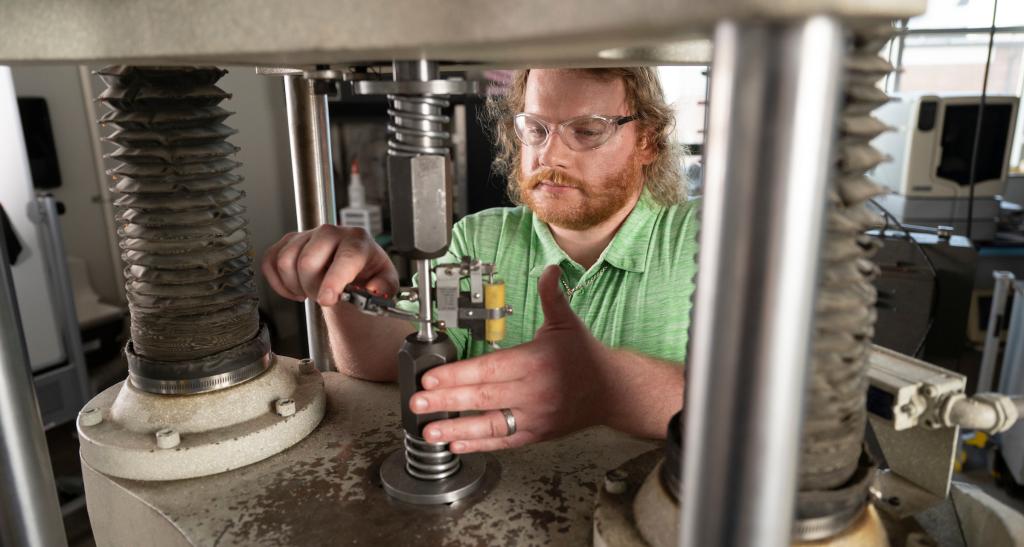
Hands-On Workspaces for a Collaborative Community
Engineering majors at York College are supported by seven laboratories — each dedicated to a single subject area, while being located in close proximity within our 43,000-square-foot facility.
The Kinsley Engineering Center brings multiple disciplines together, allowing students and faculty from a variety of perspectives to interact and collaborate. YCP Engineering is a broad, inclusive scientific community with dedicated opportunities for students to grow in their desired specializations.
Labs and Equipment for Engineers
The Automation and Robotics lab provides students and faculty with state-of-the-art tools for studying topics in automation, control, and robotics.
This lab supports the interdisciplinary Controls Stem courses:
- System Modeling and Analysis
- Automatic Control
- Applied Control
The Automation and Robotics Lab is home to the following hardware:
- Quanser rotary servo systems
- Clearpath Chameleon mobile robots
- Educational Control Products Rectilinear Plant
- Motoman industrial manipulator
- Yamaha industrial manipulators
The lab is also outfitted with laptop computers loaded with modern control system modeling and programming tools such as:
- Mathworks Matlab/Simulink
- Quanser Quarc
- NI LabView
This laboratory is intended to support instruction in the areas of communication and signal processing applications. These applications include audio signal processing, image processing, wired/wireless communications, sensors and sensor networks, radar/sonar processing, and target tracking.
The lab supports the following courses for lab work and demonstrations:
- Waves and Optics
- Introduction to Signal Processing
- Random Signals
- Communication Networks
- Communication Systems
- Independent Study courses arranged with the instructor
The lab is sized to accommodate a maximum of 20 students working in pairs at 10 student workstations. Lab stations contain instrumentation and equipment to support lab instruction:
- Agilent DSO6032A, 300 MHz 2-channel oscilloscopes
- Agilent 33220A 20 MHz Function/Arbitrary Waveform Generator
- Texas Instruments TMS320C6713 Digital Signal Processing circuit board
- Agilent E3648A Dual Output DC Power Supply
- Fluke Model 117 digital multimeter
- Additional tools and components for breadboarding and building test circuits
Each workstation also has a desktop computer containing specialized software to support students in their coursework:
- MATLAB and Simulink. Additional toolboxes include Control System, Data Acquisition, Signal Processing, Fixed Point, Neural Network, Statistics, and Symbolic Math.
- B2Spice circuit simulation software
- Microsoft Office, Visio, Project, Visual Studio
In the Electronic Instrumentation Lab, students get hands-on experience with basic electronic instrumentation like power supplies, waveform generators, digital multimeters, and oscilloscopes. They can also work with software packages for circuit simulation and data acquisition. Students use these resources, along with a wide range of sensors and motors, to build a variety of electronic devices and systems, such as AC and DC motor controllers, data collection devices, amplifiers, simple security devices, and mobile robots.
The Electronic Instrumentation Lab supports the following courses:
- Fundamentals of Electrical Engineering
- Design & Analysis of Analog Circuits
There are 12 lab stations (two students per station), and each station includes the following equipment:
- Desktop computer
- 1x Wavetek Meterman function generator
- 1x Fluke 8808A digital multi-meter
- 1x Fluke 117 digital multi-meter
- 2x Agilent E3648A DC power supply
- 1x Agilent DSO3102A 100MHz oscilloscope
- 1x Jameco breadboard
- The lab has an ample supply of tools and components for students to build test circuits.
Software licenses have been obtained for students to use for coursework:
- MATLAB and Simulink. Additional toolboxes include Control System, Data Acquisition, Signal Processing, Fixed Point, Signal Processing, Neural Network, Statistics, Symbolic Math.
- OrCAD circuit simulation software
The Embedded Systems Lab at York College is a fully ESD-safe lab space, intended for the development and use of complex digital systems. These systems often include microcontrollers, field-programmable logic devices, real-time operating systems, and various user interfaces.
This lab supports a number of electrical and computer engineering courses, including:
- Design & Analysis of Digital Circuits
- Fundamentals of Computer Engineering
- Microprocessor System Design
- Embedded Systems Design
- Capstone Design I and II
There are 10 lab stations (two students per station), and each lab station includes the following equipment:
- Two desktop computers (one for each student)
- Fluke 8846A digital bench multimeter
- Fluke 117 handheld multimeter
- Agilent E3648A 50W bench dual power supply
- TechTools DV3400 400Mhz 36 Channel PC hosted logic analyzer
- Atmel AT90USB1286 microcontroller development boards
- NXP LPC1768 ARM Cortex M-3 microcontroller development boards
- Xilinx Spartan 3E FPGA development boards
The lab also features a number of more specialized devices for use in project work, capstone design projects, or student independent studies:
- TotalPhase USB 480 Protocol Analyzer
- Agilent MSO7034A 350Mhz Mixed-Signal Oscilloscope
- Xilinx Virtex-2 FPGA development boards
- Dedicated computer workstation for long-term development, compute jobs, and other needs
- Dedicated equipment for printed circuit board soldering and assembly
While working in the embedded systems lab, students have access to not only the standard software used in other electrical and computer engineering labs, but also a number of other more specialized software tools, including:
- The Xilinx Embedded Development Kit
- The Microsoft Visual Studio Professional Integrated Development Environment
- A broad range of GNU/open source development tools, including Eclipse, GCC, and other tools
- Micrium uC-OS III
- FreeRTOS
- IAR Systems Embedded Workbench
- Segger embOS and J-Link JTAG/SWD Interface
Harry E. Zumbrun Machining Technology Lab
York College's Machining Technology Lab is a 5,500-square foot facility housed in the Kinsley Engineering Center. The lab is equipped with large and small machine tools, portable power tools, hand tools, and a variety of materials for fabrication.
In their first year, Engineering students are taught basic machine shop practices with a primary focus on safety. As they progress in their studies, students learn basic machine operations and computer numerical control (CNC) machinery, which can produce parts designed with the SolidWorks 3D CAD system.
Courses supported by the Machining Technology Lab include:
- Engineering Practice and Design Studio (EPADS)
- Materials Science
- Strength of Materials
- Machine Design
- Capstone Design I and II
Lab Machines Inventory
Haas TL-1 CNC Tool Room Lathe
- Haas TL-1 CNC Tool room lathe
- Haas TM-2 CNC Tool room mill
- Bridgeport Series I 2J head vertical mill with power feed and 0.0001” DRO
- Supermax vertical mill (Bridgeport type) with 0.0005” DRO
- Burke Machine Tool horizontal mill
- Alliant vertical mill (Bridgeport type) with power feed and 0.0005” DRO
- Hardinge HLV super precision tool room lathe
- Clausing 12-inch lathe with 0.0005” DRO
- Hardinge HSL-59 speed lathe
- Sebastian geared head engine lathe (10-foot bed)
Haas TM-2 CNC Tool Room Mill
- 2 Graziano Sag 12 engine lathes with 0.0005” DRO
- Wilton 10-inch drill press
- Dake-Johnson 20-inch horizontal band saw
- DoAll 16-inch vertical band saw
- Jet 12x24 automatic surface grinder
- K.O. Lee 6 x 18 manual surface grinder
- DoAll combination 6-inch belt/12-inch disk grinder
- DeWalt 14-inch abrasive cut-off saw
- Delta 1-inch belt grinder
- Pedestal wheel grinders and buffing/wire brush heads
- Sheet metal fabrication area comprising a Pexto 24-inch brake, Pexto 37-inch shear, Wysong 37-inch slip roll, and a Pexto 8 ½ -inch x 37-inch hardy plate mounted on a 4-feet x 6-feet workbench.
Tool Room
- Precision tooling, indicators, and gages for manual and CNC machine tools
- Assorted hardware, taps, dies, drill bits, reamers, and die grinders
- Cordless power tools
- Hand tools
- Diamond wheel grinder for sharpening carbide tooling
Wood Shop
- Portable and floor model woodworking machines (band saw, table saw, drill press, thickness planer, combination belt/disk sander, router, jig saws, hot-wire styrofoam cutter, belt and random orbital sanders, pad sander, circular saw, dust collection, air filtration)
- Workbenches
- Wood and plastic project material
Weld Shop
- Brazing and welding equipment (oxy/acetylene gas welding and cutting torches, arc welding, MIG welding, TIG welding)
- Plasma cutting
- Welding benches
- Weld fume extraction system
- Welding apparel and supplies
The Materials Science Lab is where students break things educationally. By observing and measuring the manner in which materials fail, students develop an understanding of how materials behave and how failures can be avoided. Students also learn how different forms of processing can alter material behavior.
Mechanical Engineering courses in the Materials Science and Engineering Lab include:
- Materials and Solids Lab
- Materials Science Lab
The Materials Science Lab features the following equipment:
- Tinius-Olsen Super-L tensile tester
- Tinius-Olsen S-1000-2B extensometer
- Tinius-Olsen M1000 tensile tester
- Tinius-Olsen 50ST tensile tester
- Tinius-Olsen 10,000 in. lb bench-top torsion tester
- Thermolyne 48000 furnace
- Huppert Deluxe furnace
- Wilson Rockwell 574 hardness tester
- Wilson 5YR RB Rockwell hardness tester
- Wilson 4 JS superficial Rockwell hardness tester
- Leco M-400A hardness tester
- Nikon 6501 shadow comparator
- Unimet Unitron 7307 optical microscope
- Z-Corporation Z402 3D printer
- Dimension UPring 3D printer
- Instron fatigue tester
- Satec SF-10 fatigue tester
- Tinius-Olsen impact tester (Charpy/Izod)
- Vishay Micro-measurements P-3500 strain indicator
- Vishay Micro-measurements P3 strain indicator
- Vishay Micro-measurements SB-10 switch and balance unit
- Soldering irons
- Isomet low-speed saw
- Leco Spectrum 1000 polishing system
- Labonco Protector laboratory fume hood
Power Systems and Energy Conversion (PSEC) Lab deals with power generation, transmission, control, and energy conversions. This laboratory teaches the fundamentals of power systems, power electronics, energy efficiency, motor control, and renewable energy integration.
The PSEC Lab supports the following courses:
- Power Systems
- Power Electronics
State-of-the-art PSEC Lab equipment includes:
- dSPACE
- motor control board
- power electronic converters
- photovoltaic systems
Students in the PSEC Lab also have access to the following programs to model and simulate power systems, power electronics, and renewable energy systems:
- MATLAB/SIMULINK
- PowerWorld
- PSCAD
- SPICE
In the Thermodynamics, Fluids, and Heat Transfer Lab, students discover firsthand how combustion engines and air conditioners work. They also study topics such as lift and drag on airplane wings, piping and pumping systems, fluid jets, and flow visualization. Fluid interactions with solids and the resulting energy exchange are very important aspects of mechanical engineering, and students can see this dynamic exchange in action.
Thermal sciences lab equipment includes:
- Steam Turbine Power System
- Wind Tunnel
- Water Tunnel
- Laser Doppler Velocimeter
- Transparent Combustion Engine
- Bomb Calorimeter
- Instrumented Air Conditioner
- Viscosity Drop Tower and Canon-Fenske Viscometer
- Piping System
- Pumps in Parallel and Series
- Pressure and Temperature Sensors
- Jet Engine
- Schlieren Laser Flow Visualization Test Stand
- Heat Exchanger Test Stand

Imagine learning here.
See our facilities for yourself when you visit YCP. Tours can be customized to focus on the lab spaces and programs that interest you most.


